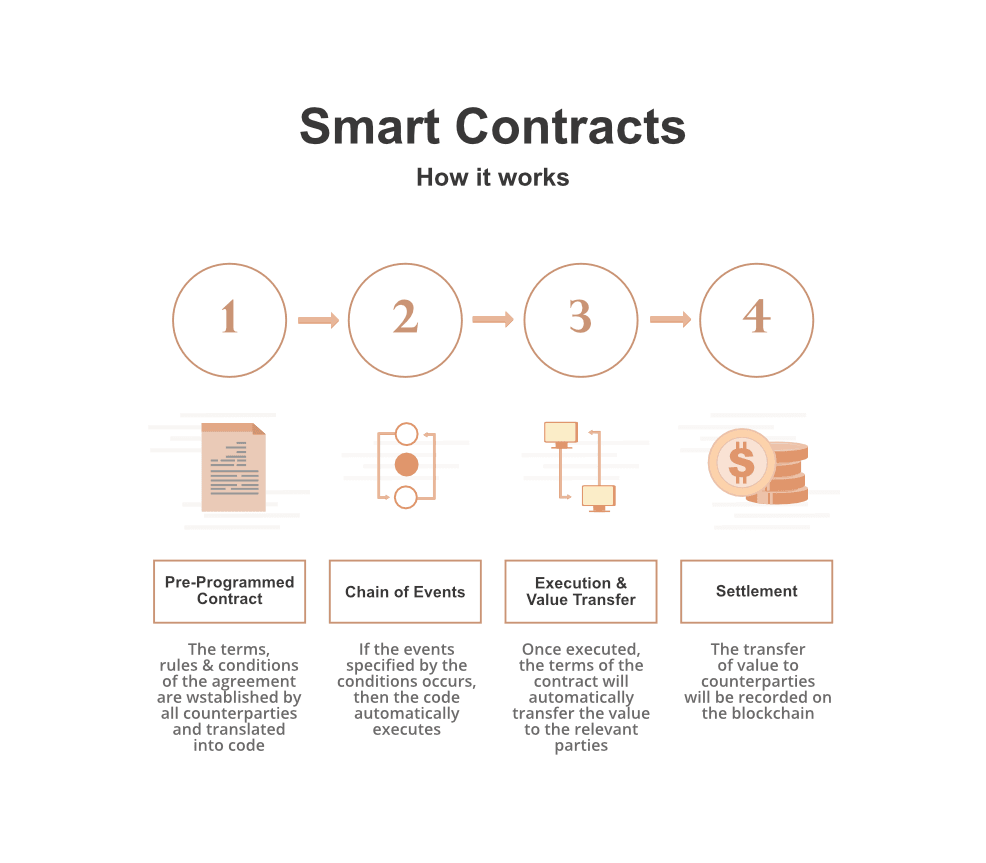What are smart contracts?
Fri, Dec 11, 2020 •5 min read
Category: Business Stories / Blockchain
When two parties want to make a formal agreement, a written contract is typically put in place. Arrangements can be between businesses, individuals, or both with something like real estate. Traditional contracts come with many problems. First, checking, validating, and approving terms is time-consuming due to complex language and the sheer length of the documents. Execution of contracts tends to need human intervention and may even require a costly third-party review. When contracts include complex terms, they need a higher degree of control, which leads to a greater risk of future disputes.
The answer to the problem is smart contracts, which translate the agreement into a computational code, avoiding ambiguity and varying interpretations further down the line.
What is smart contract, and how does it work?
Just like a traditional contract, a smart contract is an agreement between two people. However, instead of being physically written, it is run on the blockchain, stored publicly, and cannot be changed. Any transactions involving the smart contract are processed by the blockchain, allowing them to be automatic and not require a third-party intervention. A transaction will only happen if a condition is met, mitigating issues of trust when a third party is involved.

Smart contracts operate using blockchain technology. Imagine you have a file of transactions on your computer. Also, two accountants have the same file on their computer. Whenever you make a transaction, both accounts get an email to tell them. The accountants will check if you can afford the transaction and then reply to your email as verification. If everyone agrees, the file is updated.

Binding agreements
Once a deal is set up as digital code, smart contracts allow parties to bind themselves. The individuals or businesses agree on the terms, sign it, and push it to the blockchain. The contract cannot be changed or modified while being secured by a network of computers.
Transaction automation
Imagine you pay somebody $100 per month for a service. Smart contracts can define the terms in a self-executing agreement, transferring the funds on a specific day. Assets are transferred in a secure and timely manner.
Triggers
When a business works with many suppliers, much time can go into chasing and reconciling orders. Smart contracts can have obligations attached to them that trigger if a party does not deliver on a promise. For example, if a supplier does not deliver goods on a specific day, contract requirements are not met, and a client does not pay the invoice.
Removing the middle man
Smart contracts can perform the tasks of intermediaries. For example, there tend to be estate agents, solicitors, banks, buyers, and sellers involved in real estate. As blockchain technology is trustworthy, robust, and immutable, there is no need for third-party involvement. Individuals could handle a transaction like property exchange between themselves.
Developing smart contracts
There are plenty of online guides to help you get started with smart contracts. It will involve developers, testers, business analysts, and end-users. A smart contract can be built on multiple blockchain platforms like Ethereum and NEO, using an original coding language.
Smart contract use cases
There are plenty of use cases for smart contracts spanning several industries. We have talked about real estate, and below are three other significant applications.
Healthcare
Companies like EncrypGen build smart contracts to transfer patient data securely, without third party access. Patients stay in control of their data, and it cannot get into the hands of research companies without permission and/or fees.
Government
Smart contracts can enable secure and trustworthy government voting systems. For example, Follow My Vote is a secure blockchain-enabled voting platform, offering greater transparency with results. Voting through a smart contract sends a token to an address that can’t be changed, automatically verifying the counts.
Insurance
Insurance can be a document-heavy and complex industry. Smart contracts can streamline the claims process. For example, travel insurance claims are typically paid when flights are delayed or canceled. As part of the agreement with an insurer, a trigger can be in place to specify if a flight is on-time or late. When the flight is on-time, no action is taken. If the flight delay reaches a threshold, say one hour, the insurer automatically pays a $50 claim. A similar system could be in place for different insurer verticals, reducing time to settle and paperwork volumes.
Summary
Smart contracts offer enhanced security and trust, as well as reduced paperwork and resource over traditional agreements. There is amazing potential to speed up laborious processes, removing middlemen and benefitting the wider economy.












